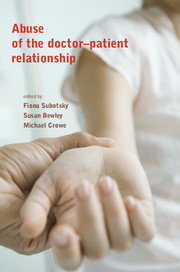Book contents
- Frontmatter
- Contents
- List of figures, tables and boxes
- List of contributors
- Foreword
- Introduction: mapping the territory
- 1 The ethical importance of boundaries to intimacy
- 2 The patient's perspective: impact and treatment
- 3 Teaching ethics and ethical behaviour to medical students
- 4 With the benefit of hindsight: lessons from history
- 5 The prevalence of boundary violations between mental health professionals and their clients
- 6 Psychiatry: responding to the Kerr/Haslam Inquiry
- 7 The general practitioner and abuse in primary care
- 8 Boundaries and boundary violations in psychotherapy
- 9 Sexual therapies: ethical guidelines, vulnerabilities and boundaries
- 10 Obstetrics and gynaecology: a special case?
- 11 Nurses as abusers: a career perspective
- 12 Medical management: governance and sexual boundary issues
- 13 Dealing with offending doctors: sanctions and remediation
- 14 Defending doctors: the protection society's experience
- 15 Regulation and its capacity to minimise abuse by professionals
- 16 The role of the General Medical Council
- Appendix 1 Extract from Vulnerable Patients, Safe Doctors
- Appendix 2 Codes of ethics of psychiatric associations in other countries
- Appendix 3 Guidance from the Council for Healthcare Regulatory Excellence
- Appendix 4 Examples of determinations by the General Medical Council's Fitness to Practise panels
- Appendix 5 Website resources and information
- Index
- Plate section
2 - The patient's perspective: impact and treatment
Published online by Cambridge University Press: 02 January 2018
- Frontmatter
- Contents
- List of figures, tables and boxes
- List of contributors
- Foreword
- Introduction: mapping the territory
- 1 The ethical importance of boundaries to intimacy
- 2 The patient's perspective: impact and treatment
- 3 Teaching ethics and ethical behaviour to medical students
- 4 With the benefit of hindsight: lessons from history
- 5 The prevalence of boundary violations between mental health professionals and their clients
- 6 Psychiatry: responding to the Kerr/Haslam Inquiry
- 7 The general practitioner and abuse in primary care
- 8 Boundaries and boundary violations in psychotherapy
- 9 Sexual therapies: ethical guidelines, vulnerabilities and boundaries
- 10 Obstetrics and gynaecology: a special case?
- 11 Nurses as abusers: a career perspective
- 12 Medical management: governance and sexual boundary issues
- 13 Dealing with offending doctors: sanctions and remediation
- 14 Defending doctors: the protection society's experience
- 15 Regulation and its capacity to minimise abuse by professionals
- 16 The role of the General Medical Council
- Appendix 1 Extract from Vulnerable Patients, Safe Doctors
- Appendix 2 Codes of ethics of psychiatric associations in other countries
- Appendix 3 Guidance from the Council for Healthcare Regulatory Excellence
- Appendix 4 Examples of determinations by the General Medical Council's Fitness to Practise panels
- Appendix 5 Website resources and information
- Index
- Plate section
Summary
Introduction
It should be made clear at the outset that the phrase ‘sexual abuse’ is used in this chapter in its broadest sense, to include anything sexual within a therapeutic relationship, from flirtatious behaviour (Box 2.1) to rape. Experts in the field now emphasise that sexual abuse should not be considered in a simplistic linear manner, particularly in terms of its effect on the patient (Gabbard & Lester, 1995). As a result, there is growing recognition that any form of sexualised or exploitative behaviour within the consulting room can have profound and devastating consequences.
Self-authored accounts of exploitative experiences of psychotherapy began in 1976 with Julie Roy's book Betrayal (Freeman & Roy, 1976) followed by Ellen Plasil's (1985) Therapist and Carolyn Bates’ and Annette Brodsky's (1988) Sex in the Therapy Hour. Such accounts have proliferated during the past three decades, such that there is now an extensive patient-authored literature on all forms of sexual exploitation in psychotherapy. In research terms, this literature is an important naturally occurring data source, as these accounts were initiated and produced by patients without thirdparty influence. This literature can therefore be considered to be a genuine reflection of the patient's perspective on professional exploitation. This is in contrast to research performed using questionnaires and interviews, which impose a structure or pre-selected categories on the data.
Box 2.1 ‘I felt powerless’
The following extract is from Surviving Complaints Against Counsellors and Psychotherapists (Casemore, 2001, p. 2).
During this time he brought up the subject of sex. He spoke at length on the subject, in a kind of caressing and gentle tone. The atmosphere in the room seemed to me to be electric, and yet as always, I told myself that it was probably part of the therapy, and any other interpretation was possibly just my imagination.
On one occasion he pointed out that as we were born in the same year and had particular stars, it was meant to mean that we were very compatible, especially as we were opposite sexes. Never having believed in any such nonsense myself I found I was feeling delighted by this revelation and sure now that he was trying to tell me something. Another time I asked him if he ever had clients who scared him when working alone in the building.
- Type
- Chapter
- Information
- Abuse of the Doctor-Patient Relationship , pp. 15 - 27Publisher: Royal College of PsychiatristsPrint publication year: 2010



